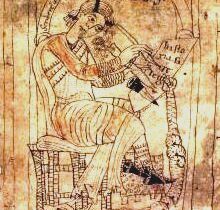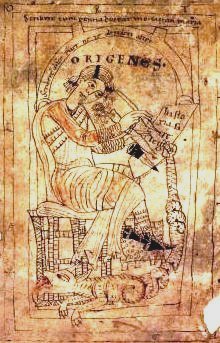No Going Back: Considering the Future of Theological Interpretation
Origen of Alexandria (c.185–c.243 CE) is the most influential allegorical reader of Scripture in the early church tradition. He read the entirety of the Christian Scriptures—Old and New Testaments—as containing the reality of Jesus Christ, which is fully revealed in the Gospels. Even in the most problematic of Old Testaments texts, like the conquest narratives of Joshua, Origen read with a conviction that Christ was embedded, at times hidden and at other times revealed, in the very fabric of the Bible. When the plain sense of the text—what we refer to as the literal or historical meaning—was not harmonious with the Gospel of Christ, Origen would look only to “higher,” spiritual levels of meaning. So, for example, when Origen writes his commentary on Joshua he equates Joshua with Jesus. He immediately “spiritualizes” a morally problematic text.[1]
As Barney mentioned in his last post, over the past few centuries there has been a shift in biblical studies toward understanding the historical nature of the text. This shift has resulted in a rejection by many a biblical scholar of Origen’s sort of “spiritual” reading because it does not take seriously the historical nature of a text like Joshua. The critique of a reading like Origen’s is that it imposes a theological lens onto the text and thus does not take the text seriously on its own terms.
In more recent years, there has been a strong push back on this sort of insistence on a historical, getting-behind-the-text reading from many angles, but one important one brings us back to an allegorical reading like Origen’s: theological interpretation. In theological interpretation, though it comes in many forms, there is an overall insistence that the Bible must be read not as primarily a historical document but as the text of the Church. A common insistence within this argument is that we, as readers, must reject these modern tools of historical interpretation and return to the premodern allegorical reading of the text; we must put down our critical tools and pick back up our theological ones.
But, there is a problem here in that that what we are often presented with is an either/or. Either we continue to read in this modern, non-Christian, non-edifying way or we return to the earlier form of reading and retain Scripture as scripture. The problem is that I do not think this either/or is actually an option for us, nor do I think it is a fair historical polemic.
Firstly, it is a poor reading of history, particularly of Origen, arguably the most influential of early allegorical readers. While he was one of the most “out there” of allegorical interpreters, Origen was not wholly uncritical when it came to his interpretation of the biblical text. Indeed, he wrote his most extensive work on text critical issues of the Bible. In his Hexapla, Origen took on the enormous task of comparing the six most influential textual receptions of the Old Testament. Through this comparative study, Origen was asking the same sorts of questions the modern textual critic asks of the text. Portions of Origen’s study are still used in the apparatus—the reference portion of the standard Hebrew text of the Old Testament—to alert the reader to textual issues. Though the dominant age of “criticisms” is our own, criticism itself is not a modern invention.
Secondly, rejecting a “modern” stance towards the Bible is simply not possible because as Robert Jenson, in Canon and Creed, states succinctly, the “Church cannot simply opt out of modernity’s critical pathos: we may not be of the world, but we are in it, and all in it are now critics.”[2] We are modern people, we have been shaped by critical questions. This is evident even in the realm of theology, where historical theologians, who are ultimately concerned with the theological dimension, are still asking very historical-critical questions about the context out of which important theological works were birthed.
Henri de Lubac, most often recognized as a key proponent of a return to a premodern “spiritual” reading of Scripture, recognizes that the polemical either/or argument is less than helpful. He insists that what the scriptural sciences (i.e. criticisms) of the modern age have provided are important for the future generation of Christian theologians and biblical scholars: “the talents of the scientific exegete and of the theologian, just as those of the historian and the spiritual man, [could] be combed in the same scholar.”[3] De Lubac recognizes that the likelihood of a scholar performing the projects of both the exegete and the theologian are not likely, particularly in the current climate of the two distinct disciplines of biblical studies and theology. He settles, then, for “the scientific exegetic to be enough of a theologian to be able to mark out his own field of work, and the theologian has to be sufficiently up-to-date on scientific activity to assure a solid foundation for his teaching.”[4]
As we move forward in conversations of theological interpretation and seek to apply the corrective provided by a return to unapologetically theological readings after an age of suspicion towards anything hinting at a theological bias, it is important that we are clear in precisely what we are after: the future of theological interpretation should not only take seriously the reading agendas of the early Church but also our present situation as critics birthed from an age of criticism. We must take ourselves just as seriously as those early readers whom we admire.
[1] This leap might seem a bit crazy (and sometimes Origen is a bit crazy), but it is not that big of leap when one considers that the Hebrew name for Joshua, Yeshua, corresponds to the title of “Savior.”
[2] Robert W. Jenson, Canon and Creed (Louisville, KY: Westminster John Knox Press, 2005), 81.
[3] Henri de Lubac, Scripture in the Tradition, trans. Luke O’Neill (NY: Crossroad Publishing, 2012), 58 cf. 9.
[4] Ibid.
Rachel
Latest posts by Rachel (see all)
- On Fairy Stories - October 20, 2016
- Are Women Human? - August 15, 2016
- The Nicene Creed: “…who spoke by the prophets.” - July 11, 2016


